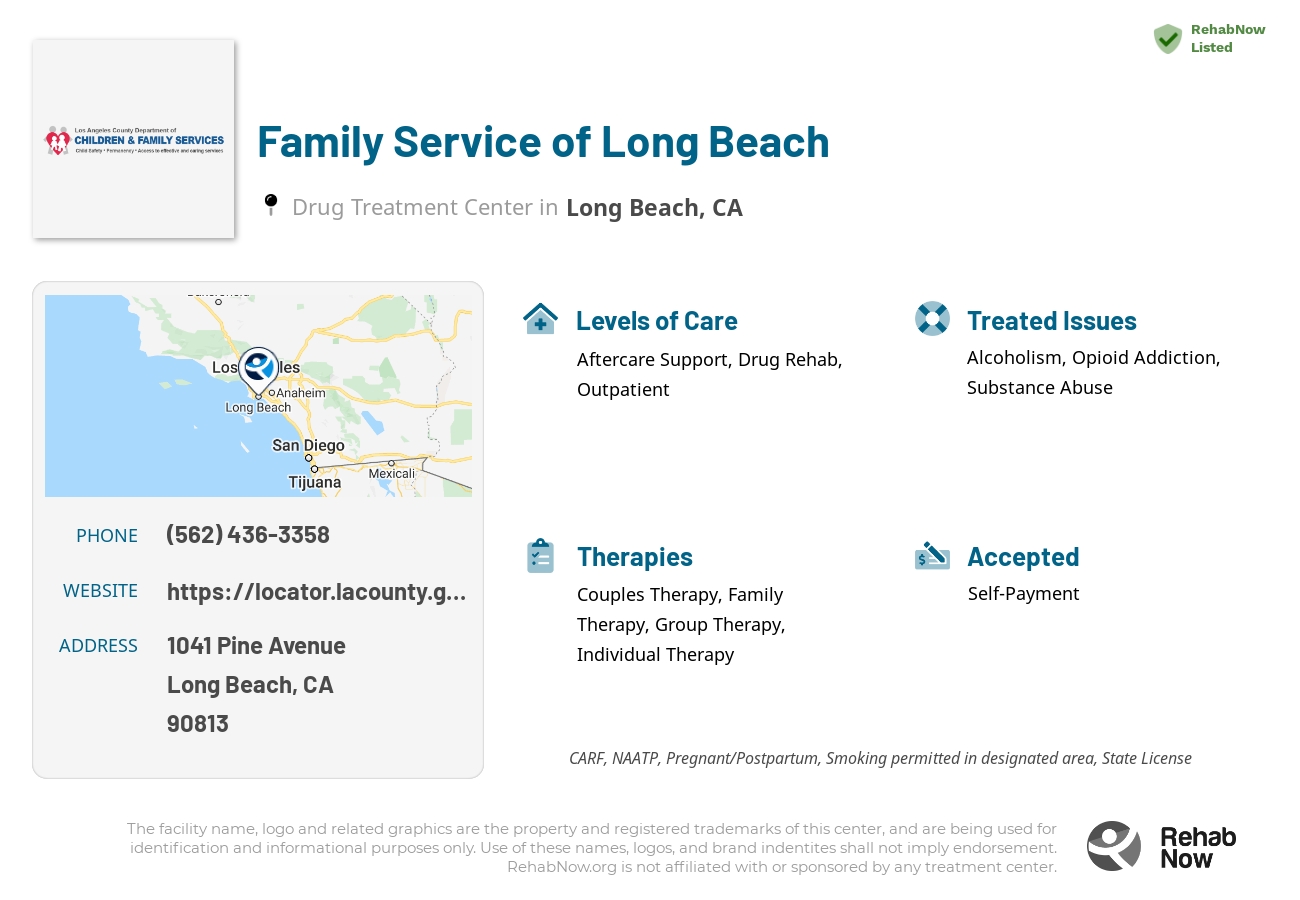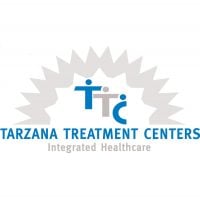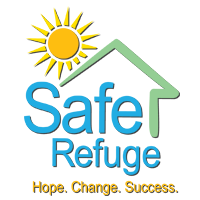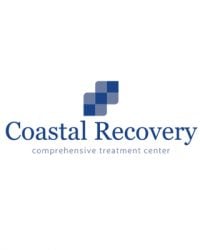Multiple patients have reported Family Service of Long Beach as permanently closed.
Research other rehabs in Long Beach, California, or get help finding an open facility.
About Family Service of Long Beach in California
Family Service of Long Beach is an Addiction Treatment Facility located in Long Beach, CA. They specialize in providing comprehensive care for individuals struggling with alcoholism, opioid addiction, substance abuse, and drug addiction. With a team of experienced professionals, they offer a range of treatment options designed to support individuals throughout their recovery journey. The facility is equipped with aftercare support, drug rehab, and outpatient levels of care to ensure that each person receives personalized treatment based on their unique needs. Whether someone is just starting their sobriety journey or is seeking continued support, Family Service of Long Beach is dedicated to helping individuals overcome addiction and achieve long-term recovery.
At Family Service of Long Beach, individuals can expect to receive a variety of services and treatment methods aimed at addressing addiction and substance abuse. They provide a safe and supportive environment where individuals can explore the root causes of their addiction and develop strategies for lasting recovery. Through individual counseling, group therapy sessions, and family therapy, clients can gain insight into their addiction and learn effective coping mechanisms. The facility also offers educational workshops and relapse prevention programs to enhance long-term success. Additionally, Family Service of Long Beach provides aftercare support, ensuring that individuals have access to ongoing resources and guidance even after completing their initial treatment. With their diverse range of services and dedicated team of professionals, Family Service of Long Beach is committed to helping individuals achieve sobriety and improve their overall well-being.
Genders
Ages
Modality
Additional
Conditions and Issues Treated
Substance Abuse Treatment is important when getting sober, as it helps addicts learn the skills they need to live a clean life. There are many different kinds of recovery treatment, including but not limited to medication-assisted therapy, behavioral therapeutic approaches, self-help groups, and counseling. Each treatment has its benefits that help addicts recover.
Counseling can help addicts learn the skills they need to live sober lives. It can be used to treat underlying mental health issues, like depression or anxiety, that could lead to relapse. Counseling can also help people find work, deal with family problems, and learn to manage living without drugs.
With so many people addicted to opioids, we need to help those who want to quit. The cycle begins when opioid addicts take opioids for a painful injury. When someone starts taking their medication differently or in excess, it means they’re addicted and at risk of overdosing.
In , detoxing from these types of treatments is the most effective way to beat this. Most facilities begin with medical assistance and then provide counseling services; rehabilitation follows after successful treatment.
Levels of Care Offered
This center offers a variety of custom treatment tailored to individual recovery. Currently available are Aftercare Support, Drug Rehab, Outpatient, with additional therapies available as listed below.
Alcohol or drug addiction, or co-occurring disorders, are treated in an outpatient program. The patient must attend therapy and other programs at the facility but can return home each night.
Outpatient treatment allows recovering addicts to live at home while receiving addiction treatment. Outpatients can attend group sessions for a few hours per week. Outpatients may also continue to work full time and study/attend school without interruption if they choose.
The accomplishment of completing a drug or alcohol treatment program is just the first step. Once that is complete, aftercare support comes into play. This includes helping people adjust to life without substances outside of guidelines with assistance like getting sober living accommodations and career counseling and AA/NA programs for those who are struggling between sobriety or want continued help in maintaining it once they have completed their initial rehabilitation at an addiction facility.
Aftercare comprises services that help recovering addicts readjust to normal day-to-day activities while working on specific issues. These problems include psychiatric issues, family problems caused by substance abuse, continuing education pursuits if desired during rehab, etc. These can last up to one year+ depending on what’s needed most urgently upon completion of earlier stages.
Therapies & Programs
Different people react differently to various treatment options. Some drug rehabilitation centers offer individualized treatment that caters to the specific needs of a drug addict. The best treatment option varies on an individual depending on the type of drug abused, life history, medical condition of the person, social circumstances, and the environment they live in now.
When a person enters drug rehab, they usually have anti-drug associations such as withdrawal symptoms, stress, cravings, etc. The first step of drug rehab is to detoxify the body from any residual substances in it. Drug rehabilitation centers usually employ trained medical professionals to help in this process. Usually, the initial detoxification lasts for five days, where the person is monitored under close supervision.
Couples therapy is a treatment method used to help couples in which at least one member of the couple has a drug addiction. The treatment is designed to help the couple strengthen their relationship to minimize the effects of drug addiction on their lives and promote healthy communication between them.
Couples therapy can be used whether the addicted partner is using drugs or in recovery. It helps the couple create healthy communication and coping skills to minimize the problem-solving abilities of one partner, which can then be directed at solving issues related to their addiction. It also helps couples address problems that may be related to drug addiction. Couples therapy can help couples feel like a team and not feel like their partner is the problem.
Couples therapy is very challenging for both the drug addict and their partner. It requires an intense commitment between the two individuals to participate in the sessions and the homework assigned between sessions.
An additional benefit of couples therapy is that it can help make other types of treatment, such as 12-step programs, more effective.
Family therapy sessions typically involve the addict and their family members. During these sessions, a therapist will work with everyone involved to help them understand addiction and find healthy ways of coping without substance abuse.
Some addicts might feel embarrassed about their substance abuse problems. By encouraging family members to attend these sessions, therapists can show addicts that they’re not alone in dealing with addiction. Therapists can also work with family members to help them understand addiction and learn how to offer support and encouragement to their loved one as they deal with substance abuse issues.
Attending group therapy at Family Service of Long Beach in , is a useful way for those seeking sobriety to realize they aren’t the only one going through it.
This is when a group of people on different recovery phases get together and talk about what they’re going through, their triggers, successes, and failures. This can include alternative types of therapies too! Group therapy may occur on an outpatient or inpatient basis with groups that have no pre-existing relationships outside the session, unlike support groups where everyone already knows each other beforehand.
Payment Options Accepted
For specific insurance or payment methods please contact us.
Additional Details
Specifics, location, and helpful extra information.
Long Beach, California 90813 Phone Number(562) 436-3358 Meta DetailsUpdated November 25, 2023
Staff Verified
Family Service of Long Beach Patient Reviews
There are no reviews yet. Be the first one to write one.
Long Beach, California Addiction Information
More than 3 million of California's citizens are addicted to illegal drugs. Almost 800,000 people use hard drugs, almost 5 million use marijuana, and another 2.1 million abuse alcohol every year. Other substance abuse issues such as binge drinking and teen drug use are also common. Many illegal drugs such as cocaine, heroin, methamphetamine, and marijuana are smuggled into the state from Mexico.
Nearly 9.8% of the population of Long Beach, CA, abuses drugs or alcohol. From 2002 to 2016, Long Beach saw a 245% increase in opioid-related hospitalizations. In 2015, 2% of eighth-graders reported using ecstasy. In 2016, Long Beach had a rate of drug overdose deaths more than 2.5 times that of the U.S. Drug treatment in Long Beach, typically involves detoxification, therapy, and aftercare support.
Treatment in Nearby Cities
- Laguna Beach, CA (28.6 mi.)
- Northridge, CA (37.1 mi.)
- Reseda, CA (35.2 mi.)
- Rancho Mirage, CA (102.4 mi.)
- South San Francisco, CA (357.5 mi.)
Centers near Family Service of Long Beach
The facility name, logo and brand are the property and registered trademarks of Family Service of Long Beach, and are being used for identification and informational purposes only. Use of these names, logos and brands shall not imply endorsement. RehabNow.org is not affiliated with or sponsored by Family Service of Long Beach.





